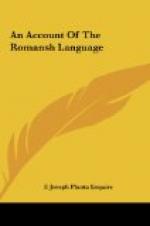1. et membri. Et si quis injecerit manum in eum qui 2. et de membre. E se alquons meist main en celui qui 3. et da members. E si alcun metta man a quel que la
1. matrem Ecclesiam quaesierit, sive sit Abbatia sive 2. la mere Eglise requireit, se ceo fust u Abbeie u 3. mamma Baselga requira, qu’ella fuss Abbatia u
1. Ecclesia religionis, reddat eum quem abstulerit et 2. Eglise de religion, rendist ce que il javereit pris 3. Baselga da religiun, renda que qu’el savares prais, et
1. centum solides nomine forisfacturae, et matri Ecclesiae 2. e cent sols de forfait, e de Mer Eglise de 3. cent solds da sfarfatt, et alla mamma Baselga da
1. parochiali 20 solidos, et capellae 10 solidos: Et qui fregerit 2. paroisse 20 solds, e de Chapelle 10 solds; E que enfraiant 3. parochia 20 solds, e da capella 10 solds: E que in frignand
1. pacem Regis in Merchenelega 100 solidis emendet; 2. la pais le Rei en Merchenelae 100 solds les amendes; 3. la paesh del Rei in Merchenelae 100 solds d’amenda;
1. similiter de compensatione homicidii et de insidiis 2. altresi de Heinfare e de aweit 3. altresi della compensatiun del omicidi et insidias
1. praecogitatis. 2. purpensed. 4. perpensadas.
* * * * *
[Footnote A: This is rather a trivial name; but the dialect has no other distinctive appellation.]
[Footnote B: Tschudi, Rhaet. Descrip. p. 43, MERIN Topogr. Helvet. p. 64.]
[Footnote C: Sprecher, Simler, Tschudi, Scheuchzer. Campell’s Chronicle is looked upon as the most authentic and circumstantial; but there being only a few manuscript copies of it extant in the hands of private persons in the Grisons, I have not been able to avail myself of his researches. Guller and Stumpfius might also have furnished some material information; but neither of them have I had an opportunity of inspecting.]
[Footnote D: Liv. lib. v. c. 34.]
[Footnote E: Other authors place the reign of this king 180 years earlier.]
[Footnote F: Plin. lib. iii. c. 5. Justin. lib. xx. c. 5.]
[Footnote G: Cluver, Ital. Antiq. lib. i. c. 14.]
[Footnote H: A spurious derivation from the verb [Greek: leipo].]
[Footnote I: Probably by them pronounced Tomiliasca, the name it now bears.]
[Footnote J: Tusis (Tuscia) and in Italian Tosana, the principal place; Rhealta (Rhetia alta); Rheambs (Rhetia ampla); Rhazunz (Rhetia ima); and above twelve other castles, the remains of which are now to be seen in the valley Tomiliasca.]
[Footnote K: In some communities there are fourteen jurors besides the Landamman.]
[Footnote L: Serv. in AEneid. lib. viii. 65. lib. x. 202. Sprech. Pall. Rhaet p. 9. Siml. Rep. Helv. p. 281. ed. 1735.]




